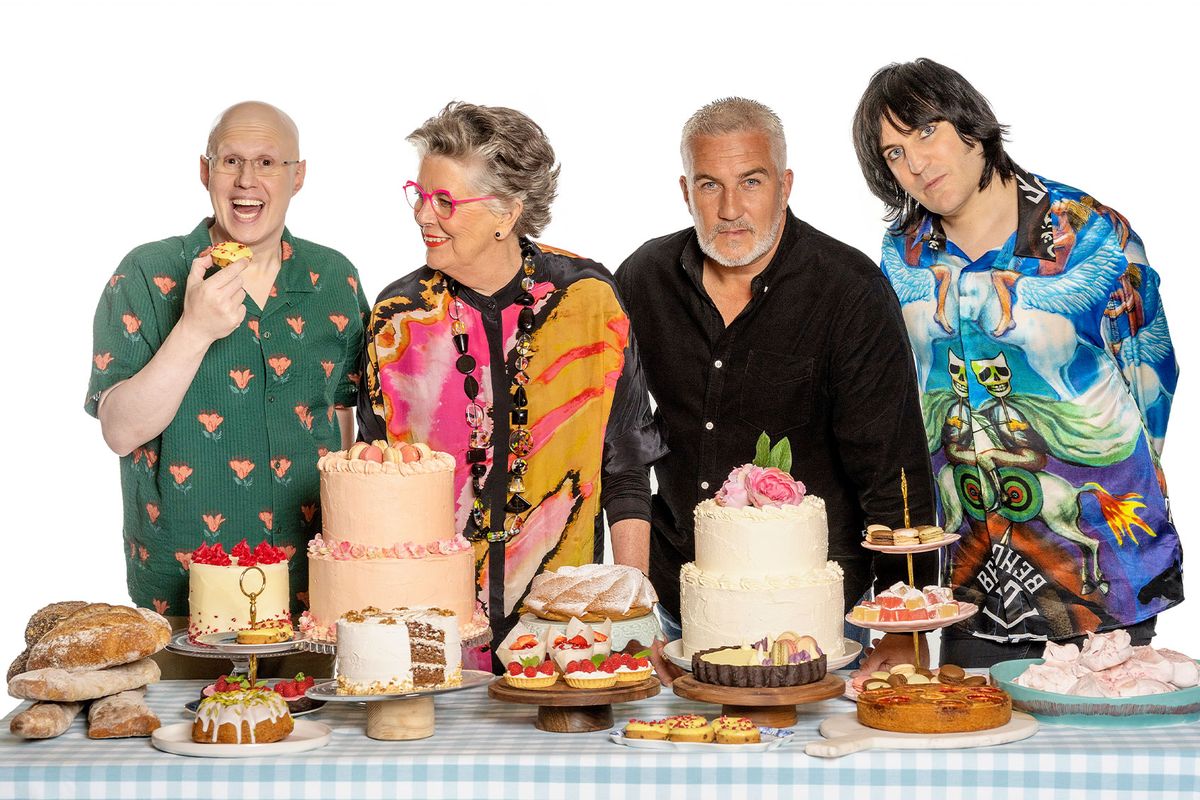Following in the footsteps of his seafaring predecessors in the Plymouth Company and London Company, Paul Hollywood journeyed to North America, tasted the fruit of the land, and announced, "Yeah, OK, I am now an expert in this."
And lo, in the tradition of the shocked people who received those uninvited English travelers hundreds of years ago and wondered what in the heck they thought they were doing, the North American audiences of "The Great British Baking Show" have generally reacted to his declaration of expertise with statements along the lines of, "Oh, hell no."
Perhaps you've seen or heard of the cringe-tastic debacle that was "Mexican Week," an episode in which Hollywood deemed tacos an example of that nation's traditional baking style. Yes, according to Hollywood, tacos qualify as baking, and creamy tres leches cakes, usually a single-decker sweet, can be layered and tiered.
Hollywood was equally authoritative about s'mores, the gooey campfire goody interpreted as a one-story building-sized marshmallow sandwiched between a smear of chocolate ganache and two digestive biscuits (huh?), gently singed with a culinary torch (what?).
At least the tres leches cake is a baked good. Up for furious debate is whether ice cream belongs in the hallowed tent -- or spring rolls, the Pastry Week episode's 29-ingredient technical dish. Tacos? Spring rolls? Aren't those considered to be products of … cooking, not baking?
Welcome to what many fear is the nadir of "GBBO" (an acronym of the competition series' U.K. title "Great British Bake Off"), where the contestant pool is stellar as always, and at least one of the tasks placed before them each week range from baffling to infuriating. Every competition reality series shows its wear as it ages.
Tacos? Spring rolls? Aren't those … cooking, not baking?
Apparently, the threshold for this show is Season 13, in which its heralded tradition of featuring inclusive casts is wrecking itself against old-school colonialist cluelessness. Have you heard this one, elbow jab, elbow jab? Sporting sombreros and cheap serapes, co-hosts, and comedians Noel Fielding and Matt Lucas open Mexican Week, the fourth episode, with Fielding saying they shouldn't make any Mexican jokes.
"What? No Mexican jokes at all?" Lucas replies. "What, not even Juan?"
Later they'd wonder aloud if Mexico is a real place or a fantasy land, like Xanadu.
 Paul Hollywood, Prue Leith, Matt Lucas and Noel Fielding (Photo courtesy of Netflix)
Paul Hollywood, Prue Leith, Matt Lucas and Noel Fielding (Photo courtesy of Netflix)
One could write off these gaffes as a one-time example of ignorant overreach by lovely people who mean well, as Hollywood's fellow judge Prue Leith assured several outlets in interviews conducted in the episode's wake.
But this forgets the two-seasons-ago mess that was Japanese Week and its various offenses against cuisine and culture. Most of those probably flew over the heads of the show's United States-based audience. Not every city has stores that feature Asian-style baking or bakeries, or could tell that the episode's steamed bun challenge featured preparations considered to be distinctly Chinese.
As far as the Mexican Week mess-ups go, the average Taco Bell employee could school Hollywood on the correct pronunciation of pico de gallo and guacamole.
Anyway, following both episodes professional bakers and specialists were kinder in their assessments than culinary enthusiasts slamming the show on social media. A few still wondered why Hollywood and Leith didn't seek inspiration from bakes considered to be more distinctly traditional in Mexico, or Japan before it.
For example, San Francisco bakery owner Raquel Goldman shared her confusion about the tacos with SFGate.com, citing the plethora of options. "There's conchas, but there's also the salty bread, like bolillos and teleras," she said, later adding, "They didn't do their due diligence. And that's not that hard to do."
She's right. For a series that's interested in authenticity, research isn't that ponderous of an undertaking. One may expect "GBBO" to be that type of show. This overlooks the fact that "The Great British Baking Show" is a commodity, not simply a TV comfort.
Competition reality in every form involves a level of play-acting.
Mexican Week, and Japanese Week before it, tie in with Hollywood's other TV venture, a culinary travel series called "Paul Hollywood Eats." His Mexican adventure for that show aired in July of this year and includes him eating "the best taco he's ever had" and sampling pan dulce, which corresponds to the Mexican-themed episode's signature bake.
According to that show's episode descriptions, Hollywood also tried to eat a tarantula and other insects…all of which is to confirm that, indeed, there probably "wasn't enough time" for a meaningful exploration of the variety of Mexico's regional doughs and preparations.
 Group Photo of Bakers, Presenters and Judges on "The Great British Baking Show" (Photo courtesy of Netflix/Mark Bourdillon)
Group Photo of Bakers, Presenters and Judges on "The Great British Baking Show" (Photo courtesy of Netflix/Mark Bourdillon)
Hollywood and Leith also frequently remind prickly viewers and contestants that they are the ultimate authority.
If they over-complicate or even exoticize dishes that aren't British or distinctly European, why wouldn't they? Competition reality in every form involves a level of play-acting. It's their job as TV judges to declare they know the right way of doing things. In terms of the s'mores, Hollywood probably went glamping and thought whatever was served to him was authentic. Hence the show's extremely mockable take on a treat traditionally prepared using pre-packaged ingredients and a found stick that isn't too dirty.
S'mores require some version of a graham cracker — which, again, requires an oven. How does one defend ice cream as the "hero" challenge on a baking show? The answer is in the episode: it was part of Custard Week, a typical component of baked goods, desserts, and decadent scoops. Plus, ice cream looks pretty on TV.
It also gave production an opportunity to change things up a bit, staggering the contestants' prep and finish times to place a different type of mouth-watering pressure on the contestants. This afforded the judges the opportunity to evaluate each submission at its best, ideally before it melted — although most of the attempts never froze correctly to start with.
Some of the ire is a matter of justifiable sensitivity, too; this season of "GBBO" comes to us in the wake of a sustained focus on Britain related to Queen Elizabeth II's death, after all. Part of processing that major event involved passionate discussions about the horrors and injustices British colonialism inflicted on cultures around the globe.
On the grand scale of crimes, those committed by "GBBO" are mainly matters of "they either know not or care not what they do" tastelessness. That's still no excuse to call katsu curry "cat-poo curry," as Lucas does in the Japanese episode, but it explains how that flatulence made it into the final edit. We're right to want a show that sets a standard for celebrating collegiality and skill to be more thoughtful about what it's stirring up on the production side of the recipe. The fact that it's falling short of that in the latest season is irritating.
Nevertheless, the contestant mix and their inspiring originality still make "The Great British Baking Show" worth consuming — with fingers crossed that future seasons will learn from the unnecessary additions that made this one fail to satisfactorily rise.



Shares